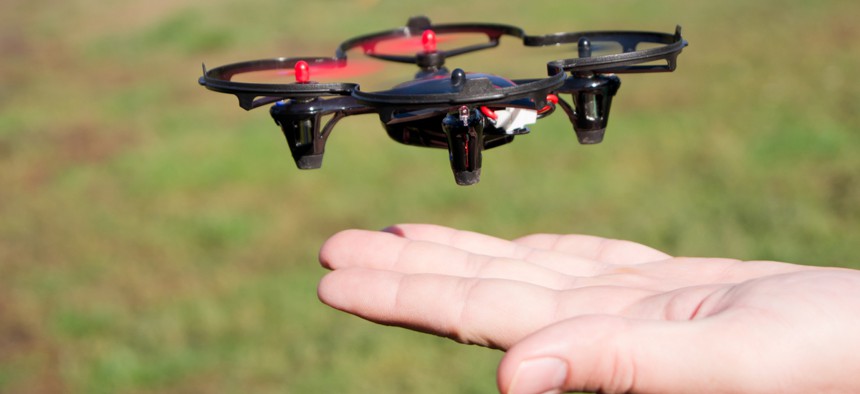Pentagon Releases Strategy for Countering Small Drones

dadalia/Shutterstock
The strategy’s accompanying implementation plan is set for release later this month, DOD officials said.
A new Pentagon strategy document defines an enterprise approach for countering small unmanned aircraft systems, known as sUAS, and outlines three lines of effort to address challenges presented by the proliferation of the devices.
The Defense Department publicly released the strategy Thursday, and officials from the Army’s Joint C-sUAS Office, or JCO, said during a Friday Center for Strategic and International Studies webinar the planning document for implementing the strategy is set to be released by the end of the month. The strategy is the first to address counter-sUAS at the enterprise level, Nicole Thomas, division chief for strategy and policy for the JCO, said.
“Through the implementation of this strategy, the department will be positioned to address the small UAS challenge we encounter across all three operating environments—that's homeland host nation and contingency locations,” Thomas said. “So the department is taking a holistic approach to the problem so we can provide commanders with forces to protect DOD personnel, assets, facilities and missions from current and future small UAS threats.”
Because of technological innovation and lower price points, sUAS applications are proliferating and only becoming more effective, according to the strategy’s statement defining the central challenges presented by sUAS. Small UAS can enable adversaries to extend sensor coverage and communications, conduct operations from afar with a greater presence, perpetrate cyberattacks and collect intelligence, according to the strategy.
The strategy is the latest development in an effort to consolidate C-sUAS approaches, according to Maj. Gen. Sean Gainey, director of the JCO, who also spoke during the CSIS webinar.
“The services have been working on this problem set really since about 2016, and were producing a lot of capability against this threat set,” Gainey said. “However, we were spending a lot of money in the department, a couple billion dollars worth, developing equipment with urgent requirements.”
Though services turned out a lot of rapid capability solutions, these solutions weren’t getting developed and matured, which is how redundancies between the services emerged, Gainey said. The secretary of defense designated the Army as the executive agent for counter-sUAS, and in turn the secretary of the Army stood up the JCO to address sUAS threats while eliminating these kinds of redundancies across DOD, he said.
In June, DOD leadership approved the results of an operational assessment of counter-UAS capabilities currently fielded and selected 10 initial systems for continued investments, Gainey said. In October, JCO and the Army’s Rapid Capabilities and Critical Technologies Office held an open house with more than 500 industry representatives to help partners understand how to best support C-SUAS efforts. The strategy organizes DOD’s enterprise C-sUAS work around three lines of effort: ready the force, defend the force, and build the team.
Ready the force focuses on synchronizing science and technology investments for counter-sUAS across the department, while defend the force is geared toward delivering joint capabilities and developing operational concepts for the Joint Forces. The third line of effort emphasizes interoperability, highlighting the importance of partnerships between partners such as the Federal Aviation Administration and allied nations.
New capabilities will be funded out of a unified research, testing, development and education fund, Gainey said, adding the JCO is looking to “demonstrate success” of these consolidated efforts. In April, the Air Force and the Army’s Rapid Capabilities and Critical Technologies Office plans to hold an industry test range event for low collateral effectors. Gainey said a message to industry regarding the event will be sent January 15.






